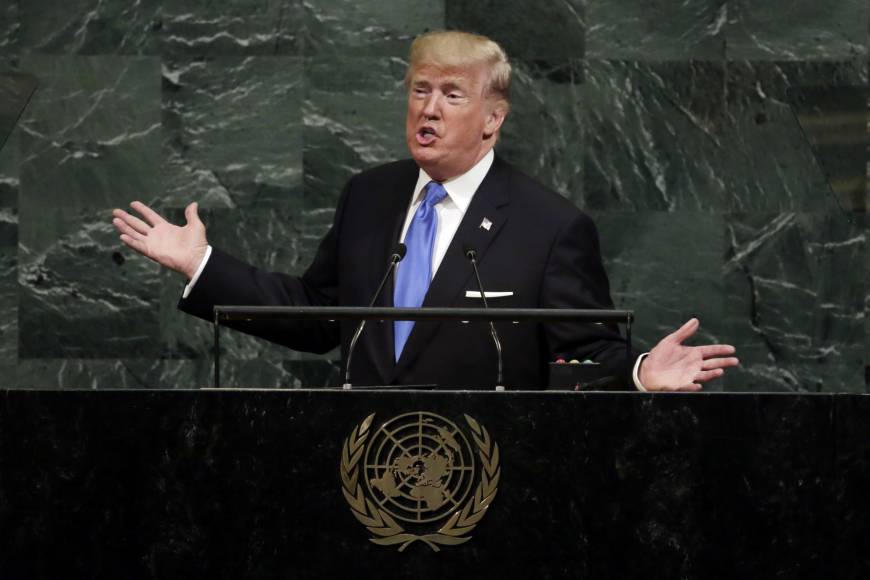Trump criticizes Iran as 'corrupt dictatorship' in UN speech

NEW YORK (Reuters) - US President Donald Trump blasted Iran on Tuesday as a “corrupt dictatorship” that is plundering its people to pay for aggression abroad, using his speech to the United Nations General Assembly to threaten more sanctions against Tehran.
“Iran’s leaders sow chaos, death and destruction,” Trump told the annual gathering. “They do not respect their neighbors or borders or the sovereign rights of nations.”
Trump’s speech in the green-marbled UN hall, while relatively low key, was aimed squarely at Iran, which the United States accuses of harboring nuclear ambitions and fomenting instability in the Middle East through its support for militant groups in Syria, Lebanon and Yemen.
But much of his 35-minute address was a defense of his “America First” policies of putting US interests ahead of any move toward globalism, a message that was greeted by silence in the hall.
Besides calling out Iran, Trump also criticized China for its trade practices but made no mention of Russia’s interference in Syria or meddling in US elections.
Trump, who begins his political rallies with boasts about his economic record in less than two years in office, used the same rhetoric before the crowd of world leaders and diplomats, telling them he had accomplished more than almost any previous US president.
The remark led to some murmuring and laughter in the crowd, taking the president slightly aback.
“I didn’t expect that reaction, but that’s okay,” he said.
Trump, who said in a Twitter post on Tuesday morning that he had given up hope for a meeting with Iranian President Hassan Rouhani while both were in New York, said he would keep up economic pressure on Tehran to try to force a change in its behavior.
In May, he withdrew the United States from the 2015 international deal to put curbs on Iran’s nuclear program in exchange for easing sanctions. Foes for decades, Washington and Tehran have been increasingly at odds since May. The accord with OPEC member Iran was negotiated under Democratic US President Barack Obama.
“Additional sanctions will resume November 5th and more will follow and we are working with countries that import Iranian crude oil to cut their purchases substantially,” Trump said.
He said the United States would help create a regional strategic alliance between Gulf nations and Jordan and Egypt, an initiative that the United States sees as a bulwark against Iran.
Trump compared US relations with Iran to what he called improved ties with North Korean leader Kim Jong Un, who Trump had met in Singapore in June as part of a still-unfulfilled drive to get Pyongyang to give up its nuclear weapons.
In his address last year to the UN, Trump insulted Kim as a “rocket man” bent on nuclear destruction. On Tuesday, Trump praised Kim for halting nuclear and missile tests, releasing Americans held prisoner and returning some remains of US soldiers killed in the 1950s Korean War.
The two leaders are trying to arrange a second summit and are exchanging private correspondence. Trump has said sanctions on North Korea would remain for now.
Troubled by US trade imbalances with many nations, Trump called for international trade reforms and littered his remarks with vows to protect American sovereignty and reject globalism.
“America is governed by Americans. We reject the ideology of globalism and we embrace the doctrine of patriotism,” he said.
Delivering a harsh message to OPEC members, Trump called on them to stop raising oil prices and to pay for their own military protection. He threatened to limit US aid only to countries that are friendly to the United States.
A Gulf diplomat said in response that “we have been doing our fair share of burden sharing.”
Crude oil prices shot to a four-year high on Tuesday, catapulted by imminent US sanctions on Iranian crude exports and the apparent reluctance of OPEC and Russia to raise output to offset the potential hit to global supply.
Trump’s main message was aimed at Iran and attempting to drive a wedge between its leadership and its people, days after an attack in southwestern Iran on a military parade killed 25 people and unsettled the country.
In remarks to reporters on his way to his speech, Trump said he would not meet the Iranians until they “change their tune.” He held out the possibility of a better relationship in the future.
In recent months, Trump had said he would meet with Rouhani without preconditions to negotiate a new deal, an offer reiterated on Sunday by US Secretary of State Mike Pompeo and extended to Iran’s supreme leader, Ayatollah Khamenei.
Rouhani said on Monday Tehran would not talk to Trump until the United States returned to the 2015 deal..
The top adviser to Khamenei, Ali Akbar Velayati, rejected the US offer on Tuesday, saying “Trump’s and Pompeo’s dream would never come to reality,” the IRNA news agency said.
Alireza Miryousefi, spokesman for Iran’s U.N. mission, told Reuters that Iran has not requested a meeting with Trump.
Some Iranian insiders have said any talks between Rouhani and Trump would effectively kill the existing nuclear accord.







